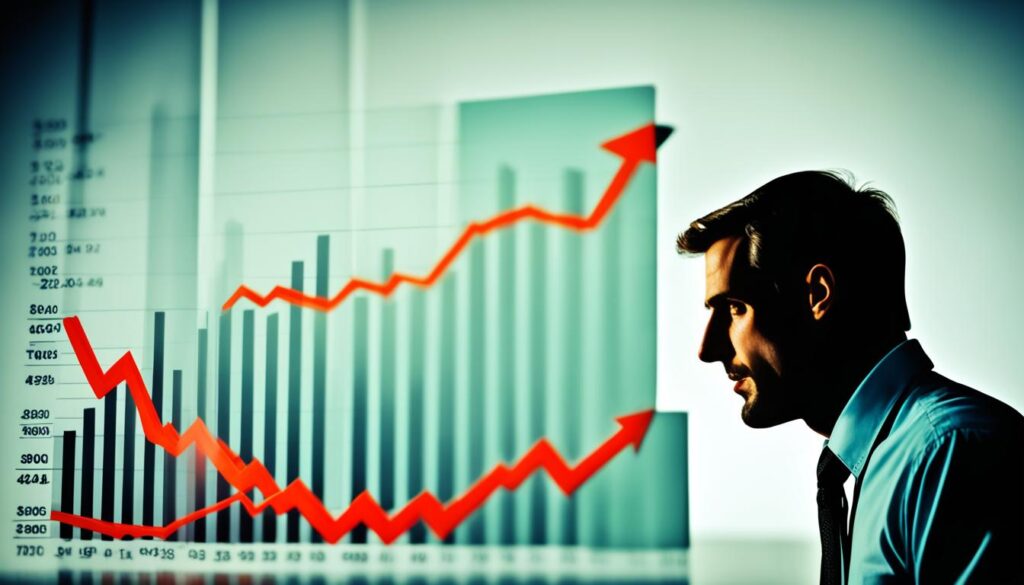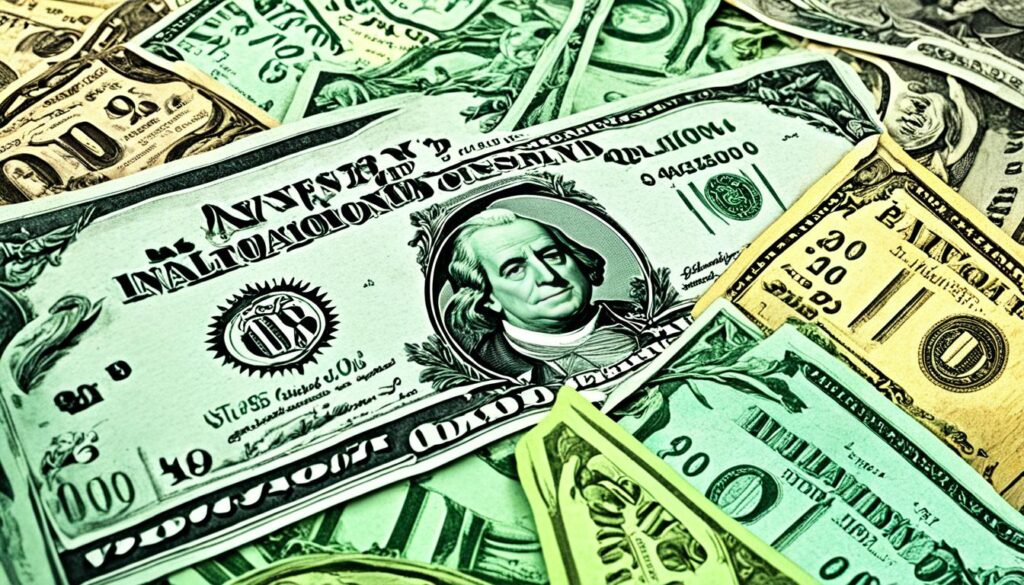As an economist, I’m noticing something strange. Inflation rates are staying high, surprising experts everywhere in early 2021. Even with less buying happening during lockdowns. Inflation is making things more expensive, from what we buy to the money we earn. It suggests a problem that might keep on growing.
Right now, the common view on inflation is wrong. It’s seen as a quick, short problem. But it’s causing lasting harm. This harm includes making prices go up, making the economy slow down, people buying less, wages not going up, and maybe even a recession. The strategies of central banks to control inflation often miss the big, long-term picture.
Key Takeaways
- Inflation has surprised on the upside, with persistently higher-than-expected data in early 2021
- The inflation impact is spreading across goods, services, and wages, suggesting a wage-price spiral
- Current popular outlooks on inflation are flawed, disregarding the long-term damage caused by the inflation cycle
- Price increases, economic downturn, reduced consumer spending, and wage stagnation are consequences of ignoring inflation
- Monetary policy and interest rates play a crucial role in managing inflation, but short-term focus fails to address long-term issues
The Resurgence of Inflation: Root Causes and Persistence
Inflation is rising again after the pandemic, surprising many. The mix of more money, supply snags, and a sudden desire for goods makes prices go up. These causes together create the ideal conditions for inflation.
Monetary Policy and Low Interest Rates
After the COVID-19 hit, central banks kept interest rates low to help the economy. This move was to avoid a big recession but also added to the swelling money supply. This led to rising prices.
With money easy to borrow, people and businesses spent more. This push-up affected prices, especially in tight supply areas.

Supply Chain Disruptions and Demand Surges
The global supply chain was hit hard by lockdowns and other pandemic effects. This caused shortages and price hikes in many areas like tech and consumer goods.
When lockdowns ended, folks had a lot of pent-up wants that suppliers weren’t ready to meet. They started bidding more for goods, making prices jump.
| Factor | Impact on Inflation |
|---|---|
| Low Interest Rates | Increased borrowing and spending, putting upward pressure on prices |
| Quantitative Easing | Expansion of money supply, contributing to inflationary pressures |
| Supply Chain Disruptions | Shortages and price increases in various sectors due to production and transportation hindrances |
| Pent-up Demand Surges | Sudden increase in consumer spending outpacing supply, leading to price hikes |
These issues are causing inflation to rise again, and it might stick around. As we recover from the pandemic, it’s key for leaders and companies to deal with inflation smartly. They need to make sure growth and stability are sustainable.
The Historical Lessons of Inflation Management
Economic history teaches us a lot about managing inflation. Yet, many people in the field have not learned these lessons. By looking at history and understanding how inflation changes over time, we can make better choices to deal with it. This helps us avoid making the same mistakes our ancestors did.
The Great Depression is a big reminder of what can go wrong with inflation. In the 1930s, when the gold standard fell, it caused a big problem worldwide. It led to economic chaos and deflation. This period shows us we need a steady monetary policy and that sudden changes can be risky.

The crash of the Bretton Woods system in the 1970s is another key example. This system tied the U.S. dollar to gold and other currencies to the dollar’s value. But, with U.S. inflation high and the Vietnam War’s costs, it became too much. The system had to end. This shows the trouble with keeping a fixed exchange rate when inflation rises and the need to adjust policies as the economy changes.
The ERM crisis in 1992 was a similar story. The ERM tried to keep European currencies stable before the euro came. But, high inflation in some countries made it hard for them to stick to their exchange rates. A crisis happened, and some countries had to leave the system. It shows the challenge of controlling inflation in a system with fixed exchange rates.
“Those who cannot remember the past are condemned to repeat it.” – George Santayana
Economists nowadays focus a lot on numbers and models. They don’t always pay enough attention to history. But, studying economic history is very important. It gives us clues about what happens if we make certain decisions. And it reminds us that inflation goes through ups and downs. With this knowledge, we can create better plans to deal with inflation and grow our economy in a smart way.
To wrap up, looking at past inflation challenges, from the Great Depression to more recent crises, shows why we must learn from history. By knowing about inflation cycles and understanding the impact of our choices, we can handle inflation well. This helps us have a stable economy over time.
Inflation’s Impact on Consumer Spending and Purchasing Power
As inflation keeps going up, it changes how we spend and what we can buy. Rising prices and not seeing more money at work make life tough for many. People have to be careful with every dollar and think hard about what they get.

Rising Prices and Stagnant Wages
Inflation makes it feel like our money is worth less. With prices jumping, we must spend more just to keep up. But our pay stays about the same, making it harder to save or splurge on fun stuff. This problem gets worse because our pay doesn’t rise as fast as things cost.
To show how prices going up hurt and our pay staying flat, look at this table:
| Year | Average Annual Inflation Rate | Median Household Income | Purchasing Power (Base Year: 2010) |
|---|---|---|---|
| 2010 | 1.6% | $49,276 | 100.0 |
| 2015 | 0.1% | $56,516 | 96.7 |
| 2020 | 1.4% | $67,521 | 90.2 |
| 2025 (Projected) | 2.5% | $72,500 | 82.1 |
This table shows how even if we earn more, we can buy less over time. This is due to prices going up and our pay not keeping up.
Erosion of Savings and Financial Security
Inflation doesn’t just impact our spending; it also eats away at any savings we have. Over the years, the value of our money drops. And this can be tough for older folks or those on set incomes. They find it harder to keep up as things get more expensive. This can lead to significant challenges, as many retirees are reliant on fixed pensions or savings that are no longer sufficient to cover their living expenses. The impact of inflation on retirement can create stress and uncertainty, forcing individuals to adjust their lifestyles or make difficult financial decisions. As healthcare and everyday costs rise, it becomes increasingly crucial for future retirees to strategize and plan effectively for a more stable financial future.
Plus, it’s not good for our retirement savings. With money losing value, we might have to save even more for the future. This can stress our budgets quite a bit.
To fight back against these inflation woes, you might want to try:
- Diversifying investments to include assets that could do better than inflation, like stocks and houses
- Changing up retirement plans to deal with how inflation will lower the value of our money
- Getting advice from financial experts on how to protect your money from inflation’s harm
As inflation keeps changing how we live, it’s key for us to catch on. Understanding its effects on our spending, what we can afford, and our financial safety is vital. With smart moves and by knowing the challenges of higher prices and flat pay, we can keep our lifestyle and future safe.
Inflation Impact: The Ripple Effects on the Economy
Inflation’s effects go further than just making things more expensive. It shakes up the whole economy. The cost of living goes up, the money’s value goes down. So, businesses get scared to spend on growing, which slows down the economy. This can make it hard for new jobs to come up. Everyone feels this change, from big companies down to everyday workers.
Reduced Business Investment and Economic Growth
High inflation makes businesses worry. They don’t want to spend money or make big plans. Companies fear they’ll lose more than they earn because costs keep going up. So, they stop thinking about growing, and the economy slows down too. When businesses don’t grow, there are fewer chances for everyone.
This fear to spend hurts new ideas and means less work for people. The economy struggles to move forward because of these fears. And with everything costing more, finding new paths becomes even harder.
Increased Borrowing Costs and Debt Burdens
In an inflation world, borrowing money gets tougher. Lenders raise interest rates, hoping to keep up with inflation. Doing business or buying things gets more expensive for everyone. And if you already owe money, things get really tight. Companies and families both feel the pinch. This can make people stop paying back, which messes things up for everyone. It might even lead to a big drop in the economy if not managed well.
FAQ
What are the root causes of the recent resurgence in inflation?
How does inflation impact consumer spending and purchasing power?
What lessons can be learned from economic history regarding inflation management?
How does inflation affect business investment and economic growth?
What are the consequences of ignoring inflation and relying on short-term measures?
Source Links
- https://www.mckinsey.com/mgi/forward-thinking/forward-thinking-on-why-we-ignore-inflation-at-our-peril-with-stephen-king
- https://convera.com/blog/foreign-exchange/weekly-global-fx-outlook-report/markets-ignoring-sticky-inflation-as-big-week-looms/
- https://www.forbes.com/sites/johntobey/2024/01/14/economy-and-investment-forecasts-rely-on-flawed-inflation-analysis/

